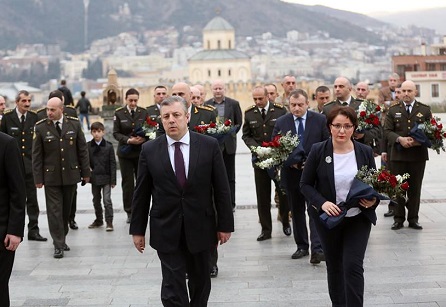Prime Minister pays tribute to Babushera tragedy victims

Georgia’s Prime Minister Giorgi Kvirikashvili has paid tribute to the fallen soldiers whose bodies were lost in the breakaway Abkhazia territory for 23 years before they were returned home for an honourable burial.
Kvirikashvili visited Sameba Holy Trinity Cathedral, the country’s central cathedral in Tbilisi’s Avlabari district to honour the 10 military servants whose bodies now lay in state in the church.
The bodies were taken from a mass grave in Abkhazia, identified using DNA testing and returned to their loved ones who did not have a grave to honour their sons and husbands for more than three decades.
All of the 10 victims were passengers of the Tbilisi-Sokhumi flight which was shot down as it attempted to land at the Babushera Airport in Sokhumi.
The aircraft crashed on the runway, killing 108 of the 132 people on board.
This was only one episode of the war that lasted for 13 months in breakaway Abkhazia in 1992-1993.
The Prime Minister was accompanied by Defence Minister Tinatin Khidasheli, Minister of Internally Displaced Persons from the Occupied Territories, Accommodation and Refugees of Georgia Sozar Subari, Chief of General Staff of the Georgian Armed Forces Major General Vakhtang Kapanadze and other high officials.
The general public will have a chance to pay tribute to the fallen soldiers this afternoon.

Photo by the PM's Press Office.
From the church six of the bodies will be taken to the Digomi Brothers’ Cemetery in Tbilisi to be buried with military honours at 5pm and the remaining four will be buried at their family graveyards in different parts of Georgia.
Minister Subari said there were tens of bodies yet to be identified and several more mass graves in Abkhazia would be opened this summer.
The war in Abkhazia in the early 1990s ended with the area becoming a breakaway region of Georgia and leaving hundreds of thousands displaced.
The confrontation started on August 14, 1992 and lasted for 403 days. It was one of many conflicts precipitated by the breakup of the Soviet Union and was one of the bloodiest, most consequential and most unresolved battles of the time.
During the 1992-93 conflict, tens of thousands of civilians and soldiers lost their lives and about 300,000 people were displaced.
The war was waged mainly between Georgian government forces on one side and Abkhaz separatist forces on the other, who fought for independence of Abkhazia from Georgia. The separatists were supported by the Russian armed forces and North Caucasian hired fighters.
The families of those killed in Abkhazia could not retreive the bodies of their loved ones. The scale of the damage and the tense situation in the region meant it was impossible to identify the bodies and returning home. Those who were killed were buried in mass graves without being formally identified.
Authorities began to excavate the graves in May 2014 following lengthy negotiations between Tbilisi and Sokhumi.
International humanitarian aid group Red Cross helped facilitate cooperation between de facto Abkhaz authorities and Georgian officials. The graves of the unknown victims were opened and DNA samples were taken from all the remains.
Once the bodies were identified they were returned to their families and loved ones. This process of opening the graves and identifying the bodies is still ongoing.
 Tweet
Tweet  Share
Share